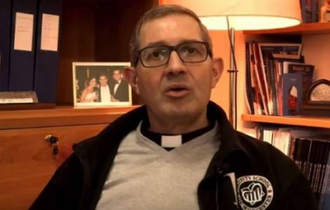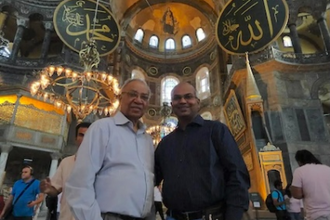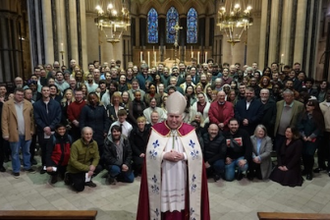Muslims, Our Brothers and Sisters in the Abrahamic Faith

Fr Victor Assouad SJ
Afghanistan has once again been captured by the Taliban, who are known for their complete disregard for human rights and international conventions, sending tremors across the region. The electronic and social media displayed images of Afghan citizens trying to leave the country in fear by hanging on to the planes that took off from the Kabul airport. Who will forget the images of the Afghan women throwing their children over the barbed wires of the airport walls begging American soldiers who were leaving Kabul for good to take them away with them? The situation has become even murkier with many a regional power entering into the embroiled scenario.
Subsequently, prejudices and biases against Islam and Muslims have once again become table-talk across India. People passionately discuss the Taliban brutality and Islamic fundamentalism. It is important to discuss and debate public issues that affect millions of lives in our neighbourhood. However, only informed deliberations will profit us. Discussions driven by bigotry will do no good but remain one-sided and superficial and lead to unfair conclusions. During my conversations with many Christians recently, some portrayed Muslims as 'communally charged fundamentalists' who spread fear and unrest among people of other faiths. We do hear many Christians making sweeping statements connecting Indian Muslims and Indian Islam with 'conspiracies against Christians'. These include members of the clergy and, at times, even members of the hierarchy. This editorial aims at offering in broad strokes some basic understanding of Islam and Muslims that will help us in pastorally engaging with Muslims and dealing with Christian-Muslim controversies.
Many Christians display a tendency to essentialize Islam by reducing it to one or another of its varied dimensions. Such essentialization is fundamentally flawed. Shabad Ahmed, in his What is Islam? The Importance of Being Islamic, presents a bold new conceptualization of Islam that reflects its rich diversity that took roots between 1350 CE and 1850 CE in the landscape that covers from the Balkans to Bengal. He presents Islam as a human-historical phenomenon, which cannot be labeled simply as 'religion', 'culture', 'civilization', or 'symbol-system' nor can be identified with some 'essence' or 'core'. Earlier, Marshall Hodgson famously saw Islam as personal piety and everything as Islamicate, thus reducing Islam to a salafi understanding. Many Christians identify Islam with a legal system that is narrow and unfair to women and linking it with all shades of fundamentalism. This happens around the world and Indian Christians are no exception to this unfair treatment of Islam and Muslims.
Students of the history of Christian-Muslim relations will know that in Europe hostile attitudes to Muslims and Islam took roots from the beginning of the encounter of the two religions, from the early Muslim conquests, the Crusades, and Turkish conquests in the Balkans including the two sieges of Vienna right into the time of colonialism. Islam was experienced as expansive military power, as religion, as culture and as political entity. Islam was also seen as a fascinating and, in some ways, superior "other" culture and way of life. The impact of Muslim cultures and sciences on philosophy, mathematics, medicine, architecture, literature, and music during the Middle Ages and early Renaissance and in contemporary times does not find adequate acknowledgment in the European schoolbooks. Indian Christians somehow appropriated these western views on Islam as a part of Christianity delivered in European package.
One major problem is the unity of din wa daula (the spheres of the religious and the political). Many Christian scholars on Islam feel that Islam has not in principle abdicated the ideal of realizing, wherever possible, the unity of din wa daula. Muslims see their religion as a way of life that covers all spheres of their lives. This creates the fear, among non-Muslims, that the acceptance of democracy and democratic constitutions on the part of Muslims in Europe are merely tactical. Their aim remains to eventually create in Europe, too, integral Islamic religious-political societies in which Islam reigns rather than human rights and equal citizenship. The non-Muslim Europeans perceive any efforts on the part of Muslims to create space for Sharia legislation, say in the area of family and inheritance law, as part of this overall endeavor. These facts are exaggerated to Islamophobic proportions. There is an essentializing of Islam here too, reducing it to a form of political religion. The diversity of Islam and its richness is not given due attention. This impression is absorbed by many members of the Indian clergy.
Jesuit Father Victor Assouad remarks that all religions and ideologies, not just Islam, at certain moments of their history have shown streaks of fundamentalism. He makes four important points: one, that radicalism does not reflect the true nature of Islam or Muslims. Islam defines itself as a religion of peace. Its etymological roots indicate: 'surrender' or 'submission' to the Lord. All the chapters of the Quran begin with this short prayer: "in the name of God, clement and merciful". To practise Islam is to practise submission to God and peace with neighbours. The second point is not an obvious one. Islam sees itself, ultimately, as the religion of "moderation". Islamic law or Shari'a is a law which seeks equilibrium and adaptation to human possibilities seen as limited or fragile. Prayer, fasting, almsgiving, marriage laws and other teachings aim to assist Muslims in finding the "golden mean" necessary to live a life of balance which leads to happiness and ensures peace in society.
Thirdly, one of the essential qualities of Muslim belief is hospitality. A Muslim can never refuse bed or board to a passing guest. They are very conscious of the marks of attention and respect offered to them and, at the same time, they do not tolerate distrust and rejection. Fourthly, Muslims are fascinated by the enormous technological advances the Western world has made in the last century. They would like to gain from this advance but at the same time are afraid of losing their soul, particularly relative to the moral dissolution they see in the West. This is why they can become rigid, be tempted by radicalism and seem to want to impose their own models. It will help if Islam and Muslims rediscover the best of their heritage, reactivate their civilizing potential and re-launch their creativity. It could greatly help them restore confidence in themselves and enable them to walk in common with others.
Indian Christians and Indian Muslims live in relative peace as minorities in the Indian democracy. Both face similar problems in dealing with the majoritarian political maneuverings. Instead of remaining alert to such intrigues of the majoritarian political discourse, many Christians fall into the traps laid by those who have vested interests in harming Christian-Muslim togetherness. We Christians and Muslims along with our Hindu brothers and sisters have the democratic and religious responsibility to work towards peace that is founded on justice and mutual respect. Christians, by their faith, are called to bear the responsibility of working for peace and harmony between Muslims and Hindus. Ours is a nation with many diversities, which could only be held together through inclusive, compassionate and progressive policies of governance.
Recently there have been a few and unnecessary tensions in Christian-Muslim relations in central Kerala. Some Syro-Malabar Church leaders have been accusing Muslims of indulging in "love jihad" and "narcotic jihad". There are individuals and groups who indulge in violence and call it Jihad. They do get theological support from sources within Islam. This is dangerous as has been pointed out by many Christian scholars who have studied Islam in depth. However, this theological support does not go uncontested by Islamic scholars. Christians must resist the temptation of judging Islam as a medieval religion revealing many faultlines in its failure to face modernity. In dealing with or speaking about Muslims and Islam, we must bear in mind a few things.
First, one must be careful not to twist the meaning of the word 'jihad', which, for Muslims, is to strive in the path of God. It is to bend one's will to the will of God. Muslim scholars explain that the greater jihad is launched against one's own lust and greed that take one away from God. It is a spiritual effort to live in peace with God and one's neighbor. Secondly, it is difficult to easily subscribe to the accusation that Muslim men engage in trapping Christian girls for marriage and then convert them into Islam with an undercurrent 'Love Jihad' plan. That needs to be checked and proved beyond doubt. We know that there have been cases of Christian girls contracting marriage with Muslim boys whom they met online. We have to respect the right of adults to take decisions about their life but at the same time we must alert young people to the dangers of making life-decisions 'online'.
Thirdly, both Muslim and Christian youth need to understand more fully their religious and cultural insights and practices. Any misunderstanding will lead to difficulties in interfaith marriages. Certain practices may invite tensions and troubles and that needs to be fully understood by the young people, boys and girls, of both religions. Tensions will arise in the context of baptism of the children, easy divorce, worship rituals, etc. Parents and religious leaders should play their advisory role to make the youth understand that quick and immature decisions lead to tensions not only in their own personal lives but also between the two religions. Christian parents must remain good models for their children in discerning God's ways in their personal and family lives.
We must remember that the Catholic Church urges her children to engage with people of other faiths as co-pilgrims in the spirit of the teachings of Vatican II. Sadly many Catholics in India, including some church leaders, neglect the teaching of the Council and the successive popes. The saintly popes Paul VI and John Paul II were greatly appreciated by Muslims around the world as they reached out to them and built lasting friendships in the spirit of Nostra Aetate. Paul VI said that Islam enshrines "moral and spiritual values" which are worthy of recognition and respect and even admiration. He further affirmed that both Muslims and Christians are called to together promote social justice, moral values, peace, and liberty among all on the basis of common truths. He hoped that what Christians and Muslims possess in common serves to unite them in an ever closer way in an authentic fraternity. Addressing the plenary meeting of the Vatican Secretariat for non- Christians (1979), John Paul II stated: "respect and esteem for the other and for what he has in the depths of his heart is essential to dialogue. To this must be added discernment and a knowledge that is sincere and profound. This last cannot be gained from books alone. It calls for fellow-feeling and identification." In the same address, he stressed that any dialogue can only be constructive and fruitful if there is love for those with whom we converse.
In his discourse to the Catholic Community in Ankara (1979) Pope John Paul II said unequivocally about Muslims: "they have, like you, the faith of Abraham in the one, almighty and merciful God". He spoke on the same lines when he addressed Muslim community in Kaduna, Nigeria (1982): "I speak these issues (of common concern) with you because you are Muslims, and like us Christians, you believe in the one God who is the source of all the rights and values of mankind." He believed that that the shared faith of Christians and Muslims is the foundation of dialogue and cooperation between them. He asked the Christians of Ankara "to consider every day the deep roots of faith in God in whom also your Muslim fellow citizens believe, in order to draw from this the principle of a collaboration with a view to the progress of man, emulation in good, the extension of peace and brotherhood in free profession of the faith peculiar to each one."
Pope Francis has, as a servant leader, taken several initiatives in building rapport with Muslims around the world. He called upon the Christian faithful to appreciate the spirituality of Muslims as they live out in their personal lives. He wrote in Evangelii Gaudium: "It is admirable to see how Muslims both young and old, men and women, make time for daily prayer and faithfully take part in religious services. Many of them also have a deep conviction that their life, in its entirety, is from God and for God. They also acknowledge the need to respond to God with an ethical commitment and with mercy towards those most in need" (#252).
The Spirit is calling us for reconciliation and togetherness. We must not resist the Spirit and speak or act in a way that grieves the Spirit.
This article was first published in Vidyajyoti Journal of Theological Reflection,Vol.85/10 October 2021
Fr Victor Edwin is a Jesuit priest who teaches Christian-Muslim Relations at Vidyajyoti, a Catholic centre for higher theological learning in Delhi. He is deeply engaged in seeking to promote understanding and goodwill between Christians and Muslims. He has a PhD in Islamic Studies from Jamia Millia Islamia, New Delhi, and has written widely on issues related to interfaith relations.


















